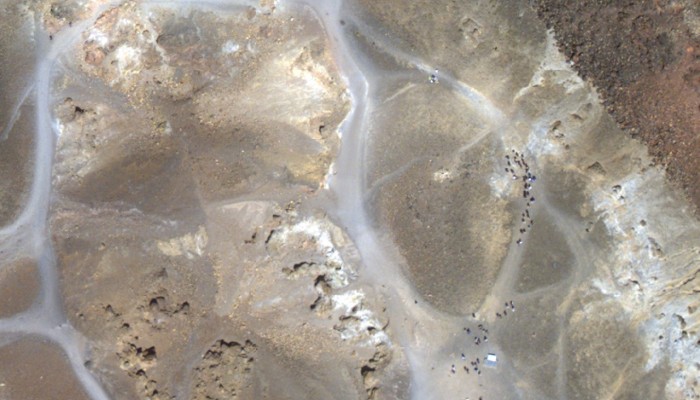Hiking across lava flows on Mt Etna to use a GPS point on the cone in the background. Credit: Rick Wall (c) Geology for Global Development 2013
GeoSphere
Welcome New EGU Bloggers
The EGU blog network has been running for about 10 months and has been a great experience for me so far. The blog network has now expanded with 6 new blogs, covering a variety of topics, and I’d like to take this opportunity to welcome the new EGU bloggers! In no particular order they are: 1. Flo Bullough (@flo_dem) and Marion Ferrat (@mle_marion) will be writing about climate and environmen ...[Read More]
Geology for Global Development
Guest Blog: Holes, Hazards and Honey
Tim Middleton, GfGD Advocacy Officer, interviews Dr. Andrew Longley, Director of the Nicaragua-based NGO Nuevas Esperanzas. It’s a warm June day, so I suggest that we sit outside. We take our coffees onto the rooftop terrace and admire the view across Oxford. Before long, however, Andrew is zipping up his fleece and starting to shiver; he’s used to the rather warmer climate in Nicaragua. In fact, ...[Read More]
An Atom's-Eye View of the Planet
Spinning a yarn about perovksite
Magnesium silicate perovskite is the most abundant silicate in our planet. Never given a mineral name in its own right, it is unstable at Earth’s surface and has only been observed directly in the lab, rather than the field. So it fails to meet the criteria set down by the masters of mineral names, the International Mineralogical Association. Instead it adopts that given to calcium titanate, ...[Read More]
Between a Rock and a Hard Place
How to finish a PhD in three years*
Welcome to our blog! Between a Rock blog is a multi-author effort, comprising five (and counting) PhD students from the School of Earth Sciences at the University of Bristol. We’re pretty excited to be welcomed into the EGU network and look forward to sharing our PhD journeys and science stories with you. To get a feel of what we write about, you can check our old material at betweenarock.co.uk. Y ...[Read More]
Four Degrees
Four degrees: Discussions on climate change, policy, environmental geochemistry and sustainability
As we enter the 400ppm world for the first time in a good chunk of geological history, issues of environment, sustainability and climate change are, more than ever, a source of discussion – and often heated dispute – in the media. As these issues are debated by governments and policy-makers, hardly one day goes by without a series of news articles on topics such as shale gas, warming c ...[Read More]
Geology Jenga
How to Find Ghosts in Sediment Cores
Hi! And welcome to Geology Jenga and our very first blog post :)! As this is our first post, we have picked a topic that integrates elements of both our research interests. In this initial post, we aim to give a flavour of the science that will be covered on our blog in the future, provide an introduction to the techniques we employ in our PhD’s and hopefully provide some useful insight into how s ...[Read More]
Polluting the Internet
If it wasn’t for those pesky aerosols…
Climate change is a subject that science knows a lot about; broadly, we can demonstrate that greenhouse gases have accumulated in the atmosphere over the past 200 years or so due to our burning of fossil fuels and that this has led to a rise in temperatures across the globe. However, our atmosphere is a complex beast and we have proven particularly adept at altering it. It turns out that as well a ...[Read More]
VolcanicDegassing
Santorini: a volcano in remission?
In January 2011, Santorini volcano in Greece began to show the first subtle signs of stirring after many decades of quiet – or at least many decades without detectable activity. This presented an exceptional opportunity to track the behaviour of a very well-studied volcano at the start of a phase of ‘unrest’. Although it may seem counter-intuitive, volcanologists don’t real ...[Read More]
Geology for Global Development
Reminder: GfGD Blog Competition
The GfGD Blog Competition is a great opportunity to put science communication into practice. Clear communication, particularly of complex scientific problems, is a skill that is highly valued by many employers. Good science communication is also essential for people working within NGOs and in developing countries to access beneficial scientific ideas and progress. We are currently accepting articl ...[Read More]

